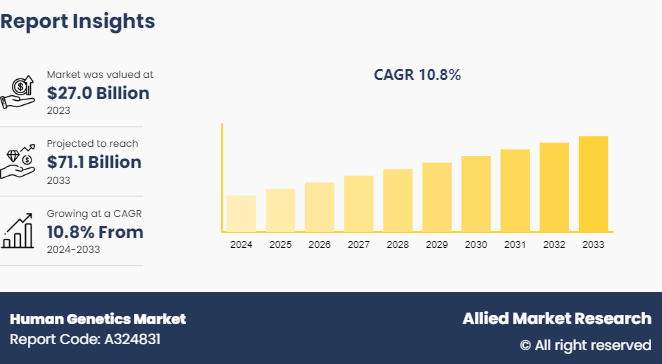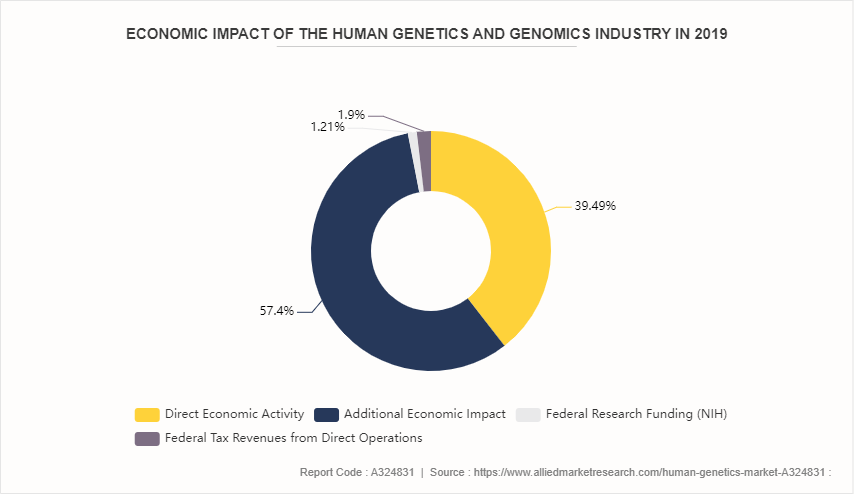Human Genetics Market, 2033
The global human genetics market was valued at $27.0 billion in 2023 and is projected to reach $71.1 billion by 2033, growing at a CAGR of 10.8% from 2024 to 2033. The human genetics market is driven by advancements in genetic research, increasing prevalence of genetic disorders, and the growing demand for personalized medicine. The integration of genomics in clinical practice, coupled with innovations in genetic testing and sequencing technologies, is accelerating the adoption of genetic services.

Market Introduction and Definition
Human genetics is the field that examines how traits are passed from parents to their offspring. The principles of inheritance in humans are fundamentally similar to those in other organisms. This field holds a central role in genetics, driven by a fundamental curiosity about human identity and the reasons behind traits. Practically, grasping the concepts of human heredity is crucial for predicting, diagnosing, and treating diseases with genetic factors. This pursuit to understand the genetic foundations of human health has led to the emergence of medical genetics.
Key Takeaways
- The human genetics market study covers 20 countries. The research includes a segment analysis of each country in terms of value ($billion) for the projected period from 2024 to 2033.
- More than 1, 500 product literatures, industry releases, annual reports, and other such documents of major energy storage system industry participants along with authentic industry journals, trade associations' releases, and government websites have been reviewed for generating high-value industry insights.
- The study integrates high-quality data, professional opinions and analysis, and critical independent perspectives. The research approach intends to provide a balanced view of global markets and assist stakeholders in making informed decisions in order to achieve their most ambitious growth objectives.
Key Market Dynamics
The human genetics market growth is significantly driven by the rising burden of genetic disorders in newborns. According to the World Health Organization's 2022 report, conditions such as down syndrome, neural tube defects, and heart defects are among the most common severe congenital disabilities. The Centers for Disease Control and Prevention (CDC) reported in April 2021, that down syndrome affects nearly 6, 000 babies born annually in the U.S., which translates to one in every 700 babies. In India, nearly 23, 000-29, 000 children are born with down syndrome each year, or one in every 831 children. These disorders greatly impact the lives of affected babies, but early diagnosis through genetic analysis can mitigate these effects. The increasing prevalence of neural tube defects, with over 300, 000 cases globally each year, further highlights the rising demand for genetic testing.
The human genetics market faces significant challenges related to genetic data privacy, potential misuse of genetic information, and ethical dilemmas surrounding genetic manipulation. Genetic data privacy is a major concern as individuals' genetic information is highly sensitive and personal. There is a risk of this information being misused by entities such as insurance companies, employers, or even malicious actors, leading to discrimination and stigmatization. In addition, the ethical implications of genetic manipulation, including gene editing technologies like CRISPR, raise profound questions about the extent to which humans should intervene in natural genetic processes. These ethical considerations involve debates over designer babies, genetic enhancement, and the long-term consequences of altering human genetics.
Patterned flow cell technology, a key feature in the latest sequencing systems, arranges tiny wells in a precise pattern to enhance the capture of DNA fragments and improve sequencing accuracy by minimizing errors. This technology is particularly beneficial for large-scale genome sequencing projects, enabling high-throughput and reliable data generation. It played a crucial role in decoding the genomes of 10, 000 individuals severely affected by COVID-19 from 2020 to 2023, resulting in the creation of the first comprehensive whole genome sequence resource for a Canadian population. The advancement and application of patterned flow cell technology significantly drive the expansions of the human genetics market, facilitating more efficient and accurate genetic analysis.
Global Human Genetics Market - Macro and Micro Economic Factors
The human genetics and genomics industry has a profound micro and macroeconomic impact, underpinned by substantial federal research funding and expansive economic activity. In 2019, federal research funding for human genetics and genomics, primarily from the NIH, reached $3.3 billion. This investment catalyzed over $108 billion in direct economic activity within the industry, supporting a total of more than $265 billion across the U.S. economy. Notably, every dollar of direct activity in this sector generates an additional $1.45 in economic impact. Federal tax revenues from the industry's direct operations alone amounted to $5.2 billion, surpassing the total annual federal investment of $3.3 billion.
Technological advancements, particularly in gene sequencing and genomic data analytics, have accelerated biomedical insights and innovations. These innovations are now integrated with biopharmaceuticals, diagnostics, and other medical technologies that leverage genomic information. Moreover, genomics is crucial in diagnosing and treating rare diseases, ending diagnostic odysseys for millions of patients and expanding available treatments. The industry not only drives significant economic growth but also advances healthcare, improving patient outcomes and quality of life.

Market Segmentation
The human genetics market is segmented into application, test, and region. As per application, the market is classified into wellness & e-commerce, preventive medicine, and diagnostic & treatment. On the basis of test, the market is divided into NIPT, carrier testing, pharmacogenomic testing, thrombophilia testing, karyotype testing, septin 9 biomarker testing, NGS, and others. Region wise, the market is analyzed across North America, Europe, Asia-Pacific, and LAMEA.
Regional Market Outlook
The human genetics market in North America is marked by significant progress in genetic research, a strong healthcare infrastructure, and a high incidence of genetic disorders. Advances in technologies like next-generation sequencing, CRISPR gene editing, and personalized medicine have been pivotal in driving market expansion, enabling precise diagnostics and customized therapies. North America leads globally in genetic testing and therapeutic advancements, supported by substantial investments in R&D. Government initiatives and regulatory frameworks play a crucial role in promoting the adoption of genetic technologies while upholding ethical standards and safeguarding patient confidentiality. Collaboration among academic institutions, healthcare providers, and biotechnology firm’s further boosts innovation and broadens the application of genetics in clinical practice across the region.
- In September 2023, Myriad Genetics, Inc., a pioneer in genetic testing and precision medicine, announced achieving two significant milestones in its strategic collaboration with Illumina Inc, a leading global provider of DNA sequencing and array-based technologies. The partnership aimed to advance and support clinical research in gene-based, targeted therapies. As part of the collaboration, Myriad and Illumina worked together to enhance comprehensive genomic profiling and homologous recombination deficiency (HRD) testing.
- In June 2021, GENinCode UK Limited, a company specializing in predictive genetics for cardiovascular disease prevention, announced its partnership with EVERSANA Life Sciences LLC (EVERSANA) to serve as its launch and commercialization partner for accessing the U.S. market. The partnership aimed to introduce and promote GENinCode's portfolio of polygenic cardiovascular disease (CVD) products tailored to genetic risk assessment.
Competitive Landscape
The major players operating in the human genetics market include Myriad Genetics, Synlab Group, Eurofins Megalab S.A, Biomarker Technology, Echevarne Laboratory, Elabscience Biotechnology Inc, NIMGenetics, Sistemas Genómicos, FullGenomics, GENinCode, and Atrys Health, and others.
Recent Key Strategies and Developments
- In July 2023, Novartis España, a division of the world's largest pharmaceutical company, and DBGen Ocular Genomics, a University of Barcelona spinoff, forged a partnership aimed at enabling patients diagnosed with retinitis pigmentosa (RP) and Leber congenital amaurosis (LCA) to pinpoint the genetic origins of their conditions. Utilizing mass sequencing of gene panels developed by DBGen Ocular Genomics, the collaboration with Novartis successfully identified the genetic causes underlying these diseases.
- In July 2023, scientists at the Centre for Cellular and Molecular Biology (CCMB) in an Indian city introduced Optical Genome Mapping (OGM) , an advanced next-generation genetic testing technology. OGM emerged as a highly precise and costly tool capable of accurately detecting genetic abnormalities in humans, pioneering what was referred to as New Generation Cytogenetics.
Industry Trends
- On March 25, 2024, Nucleus Genomics, a company specializing in next-generation genetic testing and analysis, announced the introduction of its DNA analysis product aimed at democratizing personalized medicine. The connection between DNA and health has always been profound, yet healthcare has lacked deep insights into how DNA influences health.
- In July 2023, a review conducted by the National Institutes of Health analyzed 13 studies and demonstrated the benefits of a ‘genotype-first’ approach to patient care. This approach proved particularly advantageous in diagnosing rare diseases, uncovering new gene-disease associations, expanding knowledge among people regarding previously understood diseases, and shedding light on emerging medical conditions.
Key Sources Referred
- Myriad Genetics, Inc.
- National Institute of Health
- American Society of Human Genetics
- University of Michigan
- U.S. Department of Health and Human Services
- National Institutes of Health
- National Library of Medicine
- MedlinePlus
Key Benefits For Stakeholders
- This report provides a quantitative analysis of the market segments, current trends, estimations, and dynamics of the human genetics market analysis from 2023 to 2033 to identify the prevailing human genetics market opportunities.
- The market research is offered along with information related to key drivers, restraints, and opportunities.
- Porter's five forces analysis highlights the potency of buyers and suppliers to enable stakeholders make profit-oriented business decisions and strengthen their supplier-buyer network.
- In-depth analysis of the human genetics market segmentation assists to determine the prevailing market opportunities.
- Major countries in each region are mapped according to their revenue contribution to the global market.
- Market player positioning facilitates benchmarking and provides a clear understanding of the present position of the market players.
Apart from the points mentioned above, the report includes the analysis of the regional as well as global human genetics market trends, key players, market segments, application areas, and market growth strategies.
Human Genetics Market Report Highlights
| Aspects | Details |
| Market Size By 2033 | USD 71.1 Billion |
| Growth Rate | CAGR of 10.8% |
| Forecast period | 2024 - 2033 |
| Report Pages | 320 |
| By Test |
|
| By Application |
|
| By Region |
|
| Key Market Players | Eurofins Megalab S.A., FullGenomics, nimgenetics, Elabscience Biotechnology Inc, GENinCode, Biomarker Technologies, atrys health, Echevarne Laboratory, Myriad Genetics, Synlab Group, Sistemas Genómicos |
The upcoming trends in the human genetics market globally include advancements in gene editing technologies, increased focus on personalized medicine, and growth in genetic testing and screening services.
The leading application of the human genetics market is in genetic testing and screening.
Asia-Pacific is the largest regional market for Human Genetics.
The global human genetics market was valued at $27.0 billion in 2023, and is projected to reach $71.1 billion by 2033, growing at a CAGR of 10.8% from 2024 to 2033.
The major players operating in the human genetics market include Myriad Genetics, Synlab Group, Eurofins Megalab S.A, Biomarker Technology, Echevarne Laboratory, Elabscience Biotechnology Inc, NIMGenetics, Sistemas Genómicos, FullGenomics, GENinCode, and Atrys Health, and others.
Loading Table Of Content...



